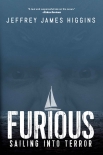Furious - Jeffrey Higgins (tohfa e dulha read online .txt) 📗

- Author: Jeffrey Higgins
Book online «Furious - Jeffrey Higgins (tohfa e dulha read online .txt) 📗». Author Jeffrey Higgins
Brad set the wheel and pulled a sea anchor from a bag. It was a submarine parachute and would keep our bow facing the wind. He took a knee and rubbed his forehead, as if he was in pain.
“Take the helm, but don’t turn the wheel unless we drift. Keep us pointed into the waves.”
“You’re much sicker today,” I said, but the wind carried my words away.
Brad stopped as if he would say something else, then shrugged and shuffled along the starboard gunwale. He carried the sea anchor in his left hand, using his right to clip his safety strap onto the lifelines. He had to unclip every five feet when the clasp hit a stanchion and then secure to the next section of line. The deck pitched and yawed as the bow plowed through the oncoming waves. Water splashed high over the sides, soaking him. He fell to his knees but staggered to his feet and pressed forward.
I could not take my eyes off him.
It took him almost five minutes to reach the bow where he hooked onto a lifeline near the bow sprit and spread his feet for balance. I could barely see him through sheets of driving rain. The bow pierced the crest of a wave and the yacht hovered for a moment, before canting forward and taking a frothy, avalanchine slide into the trough. My stomach turned, as if I was skydiving. The bow crashed into the next whitecap and Brad disappeared behind a cloud of frothy sea. My heart raced.
The mist cleared as we climbed the next liquid mountain. Brad stood there, facing the raging storm.
At the peak, he spun his body like an Olympian in the hammer toss and threw the sea anchor over the bow. It hit the surface and expanded. The yacht jerked as the sea anchor dragged against the force of the sea and we slowed. Brad gave me a thumbs up and made his way back to me.
“The anchor will keep our bow pointed in the right direction. Get below and batten the hatches and secure the compartments. I want to stay on deck in case anything happens. I’ve got the helm.”
Brad sounded commanding and strong. He took charge and knew what to do. I had never seen him with this kind of confidence at home, or even in the hospital, but here, he was in his element. Had he been born two centuries too late? I worried about leaving him on deck, because if anything happened to him, I would be lost. I could never survive on the ocean alone. I squeezed his arm and retreated below, pulling the hatch closed behind me.
Rainwater poured off my rain suit onto the deck, and I shrugged it off. I walked around the chart table, salon, and galley, making sure I had unplugged every device. I confirmed the AIS broadcast our identification and position, and I flicked on the radar screen. We were alone.
The cabin deck continued to pitch, but with our speed reduced, the movement was less violent, and I used handholds to drag myself into the starboard berth. I sat on the bed and squinted through the porthole at Brad behind the helm then I laid back and held the sides of the mattress to keep from sliding. I tried not to cry.
If he meant for this trip to relax me, sailing through a deadly environment seemed an odd choice, but I had to admit, facing mortal danger had taken my mind off Emma. The fundamental striving for survival quitted my inner critic, silenced my meaningless worry, and focused my faculties. Sailing had literally and figuratively put me back in charge of my life. It made me conscious of my choices, forced me to act instead of wandering around in a daze.
I grabbed onto the bed frame, locking my fingers around it as if my hands were vices, and flexed the muscles in my arms to steady myself. My heart pounded in my ears from exertion and fear. Our precarious position reminded me that life was fragile, that I was alive, and that I wanted to stay that way.
Faced with death, I knew I wanted to live.
CHAPTER NINETEEN
I stood at the helm with my fingers wrapped around the wheel. The sky had cleared after the storm passed, but a powerful northeast wind continued to blow, and the yacht heeled hard to port. What if a rogue wave hit us? I shivered. Being on the ocean was like rock climbing without a rope. If anything went wrong, we had limited options and no one to save us. Facing genuine danger made the everyday irritants at home seem trivial.
Brad had been at the helm all night, valiantly steering us through cresting waves and gale-force winds. His sickness had weakened him, but somehow, he had persevered. The monsoon had pushed us over seventy-five miles further south than we had planned, but he plotted a fresh course toward the Maldives and set the autopilot before retiring. His health had worsened since Bali. He had only been asleep in the stateroom for an hour, so it would be cruel to rouse him.
We sailed on a beam reach, and the harder the wind raged, the more nervous I became. If we heeled too much, Brad had told me to either let out the sails or turn away from the wind. I knew I should make some sort of correction, but I worried about messing with the sails. One mistake and I could capsize us. I decided to turn southwest. I flipped to the autopilot on the control screen, switched it off, and rotated the wheel a few degrees. The yacht responded, and the compass spun





Comments (0)